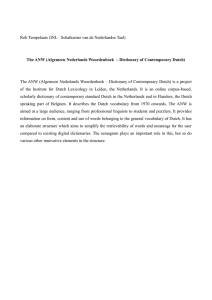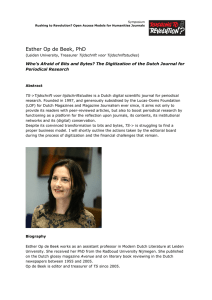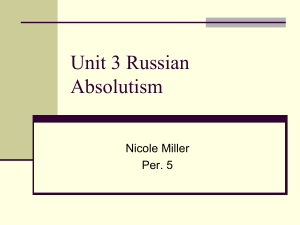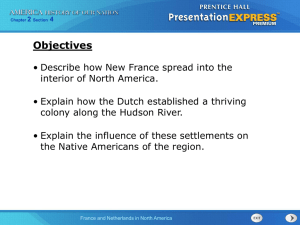De-Bunkereing in the Netherlands
advertisement
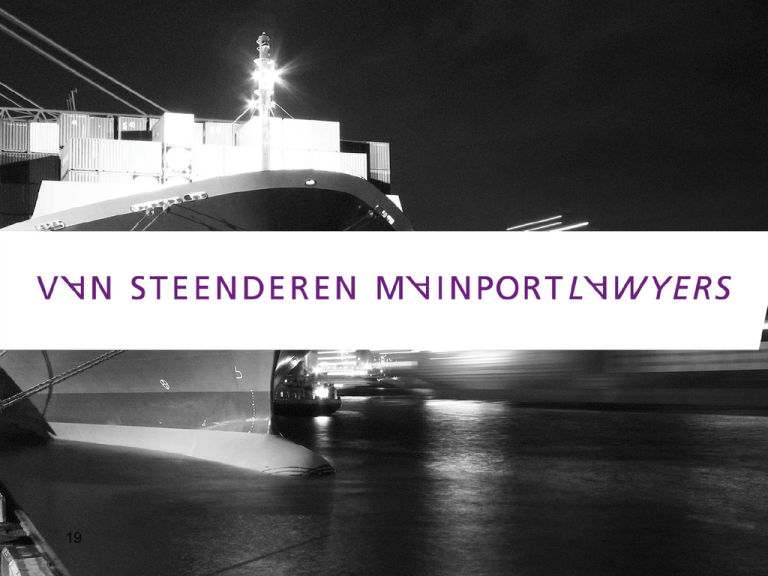
19 International Maritime Law Seminar 2014 Recent developments in maritime law: A MultiJurisdictional Perspective De-bunkering in the Netherlands 16 October 2014 contribution by Charlotte J. van Steenderen 2 Introduction •The Dutch authorities have been focusing heavily on bunker fuel operations following a series of incidents involving admixture of hazardous waste to bunker fuel. •More specifically, the Dutch authorities have been “increasingly concerned” about de-bunkering of “off-spec” fuel in Dutch waters due to the perceived risk that the fuel could contain hazardous waste. 3 Introduction •De-bunkering is defined as the removal of fuel from a vessel that was meant to be used for sailing. •The specific situation determines whether this debunkered fuel must be classified as waste or whether it can be regarded as a product. •Answer to question above determines which regulations apply to the de-bunkered fuel. 4 Introduction •The Dutch Human Environment and Transport Inspectorate (“Inspectorate”) has been delegated by the Dutch government to monitor the compliance with the rules and regulations with regard to de-bunkering of vessels in the Dutch territorial waters. •In line with their concern, in a significant number of cases the Dutch authorities have required debunkered fuel to be “treated, handled and disposed of as waste” unless there has been proof to the contrary. 5 De-bunkering in the Netherlands – Relevant legislation Relevant legislation: •Directive 2008/98/EC of the European Parliament and of the Council of 19 November 2008 on waste (“Waste Framework Directive / EC Directive”). •The Dutch Environmental Management Act (“Wet Milieubeheer”). 6 De-bunkering in the Netherlands – Relevant legislation •Article 3 paragraph 1 EC Directive: “waste” is “any substance or object which the holder discards or intends or is required to discard.” Definition is rather vague; any substance is either waste or nonwaste. •Article 3 paragraph 2 EC Directive: “hazardous waste” is “waste which displays one or more of the hazardous properties listed in Annex III.” •The Environmental Management Act prohibits the transfer of hazardous waste to a party which is not authorized to receive such waste. 7 De-bunkering in the Netherlands – Interpretation Dutch authorities •The Dutch authorities adopt a very strict policy. •No clear guidelines yet, but the Dutch authorities have explained that bunker fuel should be handled and disposed of as “waste” if the bunker fuel is found not suitable for use on board a particular vessel due to which the Captain of that vessel takes the decision to de-bunker. •The unusable fuel oil may only be handed over to a licensed waste collector. 8 De-bunkering in the Netherlands – “Marjatta”-case •On 7 October 2011 officers of the Dutch National Police discovered de-bunkering of approx. 100 mt of heavy oil from the seagoing vessel “Marjatta” into the inland barge “Chopin”. •The Chief Engineer and Master of the “Marjatta” stated that they had encountered difficulties with the heavy fuel (RMG IFO380); the vessel had suffered repeated clogging of separators. •The Owners of the “Marjatta” decided to return the bunkers to the original Polish supplier in a Dutch port. 9 De-bunkering in the Netherlands – “Marjatta”-case •Analysis report of samples taken on board of “Chopin” shows that the fuel had a Total Sediment Potential which is not in conformity with ISO 8217 (TSP was too high). •Judgment Middelburg District Court 17 October 2011: “the heavy fuel de-bunkered in the Netherlands was not fit to be used for the purpose of using it as bunkers on board of a seagoing vessel. The heavy fuel qualified as hazardous waste. The de-bunkering is qualified as an illegal manner of disposing of hazardous waste.” 10 De-bunkering in the Netherlands – “Marjatta”-case •Since the decision in the “Marjatta”-case, permission to de-bunker is withheld, unless the de-bunkering operation is executed by an authorized waste disposal company. 11 De-bunkering in the Netherlands – Shellcases (ECJ 12 December 2013, joint cases C241/12 and C-242/12) •Preliminary ruling European Court of Justice (“ECJ”) about de-bunkered contaminated diesel. Under the circumstances described in the ruling the debunkering of diesel will not fall within the scope of illicit trade in waste. •On 3 September 2006 Shell in the Netherlands loaded Ultra Light Sulphur Diesel (“diesel”) on to a barge for delivery to a client in Belgium. •After delivery in Belgium it was discovered that, at the time of loading of the barge, the tanks were not completely emptied, which resulted in the diesel being mixed with MTBE. 12 De-bunkering in the Netherlands – Shellcases (ECJ 12 December 2013, joint cases C241/12 and C-242/12) •The consignee returned the off-spec diesel to Shell, which shipped the consignment back to the Netherlands. •In criminal proceedings before the Rotterdam District Court, the Public Prosecutor stated that, at the time of shipment from Belgium to the Netherlands, the product in question constituted waste and Shell was guilty of illegal traffic. Shell argued, however, that the consignment at hand could not be categorized as waste. •Rotterdam District Court asked the ECJ for a ruling. 13 De-bunkering in the Netherlands – Shellcases (ECJ 12 December 2013, joint cases C241/12 and C-242/12) •The fact that Shell took back the consignment at hand with the intention of blending it and placing it back on the market was considered to be of decisive importance in the present case. •ECJ: “it would not be justified at all to make goods, substances or products which the holder intends to exploit or market on economically advantageous terms in a subsequent recovery process subject to the provisions of the EC Directive.” 14 De-bunkering in the Netherlands – Shellcases (ECJ 12 December 2013, joint cases C241/12 and C-242/12) •ECJ: “Consequently a consignment of diesel accidently contaminated with another substance is not covered by the concept of “waste”, provided that the holder of that consignment does actually intend to place that consignment, mixed with another product, back on the market, which is for the referring Court to ascertain.” •The case was then referred back to the Rotterdam District Court which still has to decide whether the cargo of fuel oil in the case at hand concerned waste or not. 15 De-bunkering in the Netherlands – Shellcases (ECJ 12 December 2013, joint cases C241/12 and C-242/12) •According to the ECJ ruling the focus in every case must be on whether the holder of a substance “intends to or is required to discard” the substance. •The re-use argument is to be seen in the light of the principle also applied by the ECJ, that is that re-use of the material had to be a “certainty”. The question of sufficient certainty is one of fact for the national courts to decide. 16 De-bunkering in the Netherlands – “Freja Crux”-case •Since the ECJ ruling, we have seen a judgment by the Dutch Council of State dated 2 April 2014 in the so-called “Freja Crux” case. •Stena Weco (time charterer of the “Freja Crux”) had purchased a quantity of HSFO, supplied on board on 14 November 2012 in Rotterdam. A few days later, this quantity was de-bunkered in Amsterdam. 17 De-bunkering in the Netherlands – “Freja Crux”-case •Although analysis of the HSFO showed that the fuel was in conformity with the specs provided for in ISO 8217 (2005 and 2010), the Owner of “Freja Crux” was of the opinion that the bunkers did not meet their quality standards for the particular ship. The Owner ordered the bunkers to be removed. •The bunker supplier agreed to take back the fuel for the sound market price. The time charterer notified the Dutch authorities about the debunkering beforehand. 18 De-bunkering in the Netherlands – “Freja Crux”-case •The authorities were of the opinion that the bunkers had to be deemed waste. They threatened pressing criminal charges if the bunkers would be redelivered to the bunker supplier or if the vessel would depart with the fuel still on board (to be de-bunkered elsewhere). •In line with the ECJ ruling, the Dutch Council of State ruled that the time charterer could not be considered to have had the intention to discard the fuel within the meaning of the definition of waste. 19 Conclusion •The recent decisions in the Shell and “Freja Crux” cases reverse the very strict interpretation which the Dutch authorities have placed on off-spec bunkers. •The Dutch authorities were of the opinion that if a consignment of fuel oil could not be used for its immediate intended purpose (i.e. the burning on board of the vessel in question), the de-bunkering was to be interpreted as an act of discarding and, as a consequence, the consignment of fuel oil to be de-bunkered had to be deemed a waste product. 20 Conclusion •The ECJ ruled in the Shell cases that such literal interpretation is wrong and that one should take into account whether that substance is still of use to the holder. •A crucial aspect of the “Freja Crux” case was that the consignment of fuel oil was to be returned to the original bunker supplier against repayment of the full purchase price. Such redelivery is not deemed to be an act of discarding. 21 Conclusion •It remains to be seen, however, if this principle formulated by the Dutch Council of State can also be relied upon if such a redelivery to the supplier is not made against repayment of the full purchase price. We are of the opinion that there are compelling arguments in favour of that view. 22 Thank you for your attention 19




